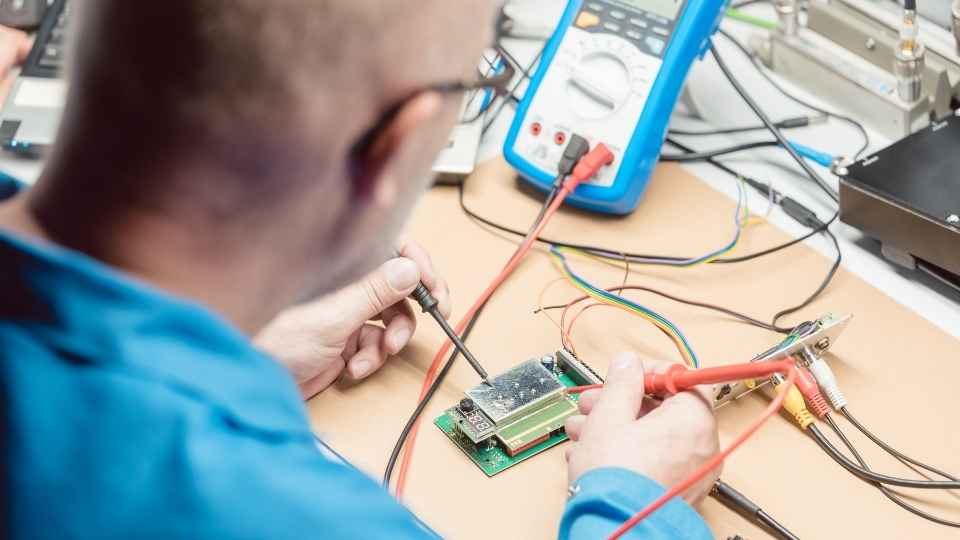
In today's fast-paced world, where technological advancements continue to reshape industries, the role of an Electronics Project Manager has become more crucial than ever. From concept development to execution, these professionals are responsible for overseeing projects that drive innovation and success.
However, a key factor in achieving project goals lies in effective resource allocation and budgeting. By strategically managing resources and finances, project managers can optimize productivity, minimize risks, and ultimately propel their projects towards triumph.
In this article, we will explore how resource allocation and budgeting play a pivotal role in driving successful electronics projects.
Key Takeaways
- Resource allocation ensures efficient and productive completion of tasks.
- Effective budgeting helps prioritize spending based on critical path method.
- Resource optimization maximizes project success by minimizing wastage and ensuring efficient utilization.
- Balancing resource allocation and budgeting leads to project efficiency by achieving objectives within timelines and financial constraints.
The Importance of Resource Allocation in Electronics Project Management
Resource allocation plays a crucial role in the success of electronics project management. It ensures that the right resources are assigned to tasks and activities, maximizing efficiency and productivity. In the field of electronics, where projects often require specialized knowledge and skills, allocating resources effectively is essential for achieving desired outcomes.
This involves identifying the specific requirements of each task or activity and matching them with individuals who possess the necessary expertise. By doing so, project managers can ensure that tasks are completed on time and to a high standard.
Additionally, resource allocation helps in optimizing costs by avoiding unnecessary duplication of effort or overstaffing. It allows for a systematic approach to managing resources throughout the project lifecycle, enabling flexibility in adjusting allocations based on changing project needs.
Ultimately, effective resource allocation enhances overall project performance and contributes to successful outcomes.

Strategies for Effective Budgeting in Electronics Projects
Effective budgeting strategies play a critical role in ensuring the financial viability and overall success of electronics projects. By carefully planning and allocating resources, project managers can optimize their budgets to meet project requirements while maximizing efficiency and minimizing waste. One key strategy is to conduct thorough research on the cost of materials, equipment, and labor involved in the project. This allows for accurate estimation and allocation of funds.
Additionally, implementing a system for tracking expenses and regularly reviewing the budget helps identify any deviations or potential issues early on, allowing for timely adjustments. Another effective approach is to prioritize spending based on the critical path method, focusing resources on activities that are essential for project completion.
By adhering to these strategies, project managers can ensure that their budgets are effectively utilized, contributing to the success of their electronics projects.
Transition: In addition to efficient budgeting practices, maximizing project success through resource optimization is another crucial aspect of electronics project management...
Maximizing Project Success Through Resource Optimization
To maximize the success of a project, it is essential to strategically analyze and utilize available assets. Resource optimization plays a crucial role in achieving project goals efficiently. Here are three key strategies for maximizing project success through resource optimization:
Identify and prioritize critical resources: Determine which resources are essential for project success and allocate them accordingly. This ensures that the most important aspects of the project receive adequate attention and support.
Optimize resource allocation: Analyze resource availability and requirements to optimize their allocation across different project tasks. By aligning resources with specific needs, you can minimize wastage and ensure efficient utilization.

Embrace flexibility: Projects often encounter unexpected challenges or changes in priorities. By maintaining flexibility in resource allocation, you can adapt quickly to new circumstances without compromising on overall project objectives.
By strategically analyzing and utilizing available resources, projects can achieve greater efficiency, productivity, and ultimately, success.
In the subsequent section, we will explore how balancing resource allocation with budgeting further enhances project efficiency.
Transition sentence: However, effective resource optimization alone is not enough; balancing resource allocation with budgeting is equally vital for ensuring optimal project efficiency.
Balancing Resource Allocation and Budgeting for Project Efficiency
Achieving optimal project efficiency requires a careful balance between allocating resources and managing the project budget. Resource allocation involves identifying the necessary personnel, equipment, and materials needed for each phase of the project. This ensures that the right resources are available at the right time, minimizing delays and maximizing productivity.
On the other hand, effective budgeting involves estimating costs, setting financial targets, and tracking expenses throughout the project lifecycle. It allows project managers to make informed decisions about resource allocation based on available funds.
By striking a harmonious equilibrium between resource allocation and budgeting, electronics projects can achieve their objectives within stipulated timelines and financial constraints. However, this balancing act is not without its challenges. Overcoming challenges in resource allocation and budgeting for electronics projects requires proactive planning, accurate forecasting, continuous monitoring of expenditures, and timely adjustments to ensure efficient utilization of resources while adhering to budgetary limitations.

Transition: Let's now explore some common challenges faced by project managers in resource allocation and budgeting for electronics projects.
Overcoming Challenges in Resource Allocation and Budgeting for Electronics Projects
One of the key hurdles faced by professionals in this field is striking a balance between the available resources and the allocated budget for electronic ventures. Resource allocation and budgeting play a crucial role in driving successful projects, but there are several challenges that need to be overcome.
Here are three important considerations:
Prioritizing essential resources: It is vital to identify and prioritize the necessary resources to ensure smooth project execution. This involves understanding the project requirements, conducting thorough research, and making informed decisions.
Efficient cost management: Managing costs effectively is essential for staying within the allocated budget. This includes careful planning, tracking expenses, negotiating with suppliers, and finding cost-saving alternatives without compromising quality.
Flexibility and adaptability: Electronics projects often require adjustments due to unforeseen circumstances or changing market trends. Having flexibility in resource allocation allows for quick decision-making and adapting to new requirements without disrupting project timelines.
Frequently Asked Questions
How Can Resource Allocation Impact the Overall Success of an Electronics Project?
Resource allocation plays a crucial role in the overall success of an electronics project. It ensures that the right resources are assigned to tasks, optimizes efficiency, minimizes bottlenecks, and maximizes productivity, leading to successful project completion.

What Are Some Common Strategies for Effective Budgeting in Electronics Projects?
Effective budgeting in electronics projects involves strategic planning and allocation of financial resources. This ensures the project stays within budget, enables proper resource utilization, and ultimately drives successful outcomes by minimizing risks and maximizing returns on investment.
How Can Project Managers Maximize Project Success Through Resource Optimization?
To maximize project success through resource optimization, project managers must carefully allocate resources based on project requirements and priorities. By effectively managing budgets and ensuring efficient utilization of resources, projects can be executed successfully within constraints.
What Are Some Key Considerations When Balancing Resource Allocation and Budgeting for Project Efficiency?
Balancing resource allocation and budgeting for project efficiency requires careful consideration of key factors. These include optimizing resource utilization, aligning budget with project goals, monitoring expenses, and adapting strategies to ensure successful project outcomes.
What Are Some Common Challenges Faced in Resource Allocation and Budgeting for Electronics Projects, and How Can They Be Overcome?
Common challenges in resource allocation and budgeting for electronics projects include limited funding, competing priorities, and unforeseen expenses. These can be overcome through careful planning, regular monitoring, effective communication, and the use of project management tools.
 Basic Electronics ConceptsEssential ToolsCircuit Design BasicsMicrocontrollersDIY Electronics ProjectsRoboticsPrivacy PolicyTerms And Conditions
Basic Electronics ConceptsEssential ToolsCircuit Design BasicsMicrocontrollersDIY Electronics ProjectsRoboticsPrivacy PolicyTerms And Conditions
